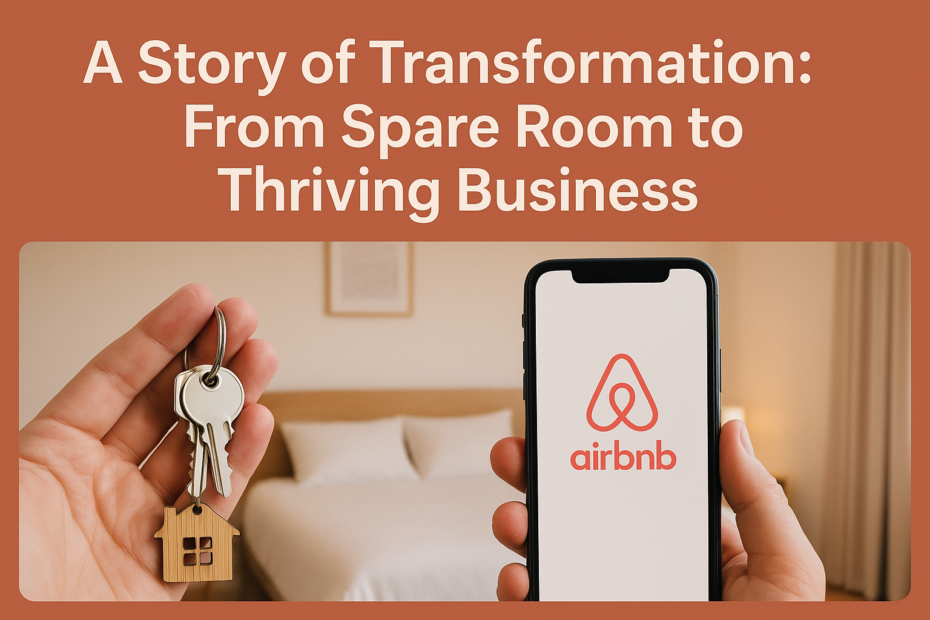In 2008, two roommates in San Francisco, Brian Chesky and Joe Gebbia, struggled to pay their rent. To make some extra cash, they decided to rent out air mattresses in their living room to travelers visiting for a conference. They called it “Air Bed & Breakfast.” Little did they know, this simple idea would grow into a billion-dollar company—Airbnb—that would disrupt the global hospitality and real estate industries.
Fast forward to today, millions of homeowners and investors worldwide are leveraging Airbnb to turn their properties into money-making machines. From a retired couple in Paris renting out their spare room to digital nomads in Bali running multiple Airbnb units, the platform has created endless opportunities in the property business.
Real-Life Benefits of Airbnb for Property Owners
- A Family’s Side Income: Lisa, a single mother in New York, started renting out her extra bedroom on Airbnb to cover her mortgage. Within months, she was making enough to not only pay her bills but also save for her child’s education.
- A Young Entrepreneur’s Investment Strategy: Rahul, an investor in India, purchased a small apartment in Goa and turned it into an Airbnb rental. By targeting tourists and offering unique experiences, he doubled his rental income compared to a traditional lease.
- Retirement Security for a Couple: After retiring, John and Susan converted their vacation home in Florida into an Airbnb property. The passive income from guests now funds their travels around the world.
The Rise of Airbnb in the Property Market
Founded in 2008, Airbnb started as a simple idea—renting out spare rooms to travelers to make extra money. Over the years, it has grown into a global phenomenon, with millions of listings in over 190 countries. The platform connects property owners with travelers, offering alternatives to traditional hotels and resorts.
For property investors, Airbnb presents an opportunity to generate higher rental income compared to long-term leasing. Many landlords now prefer short-term rentals due to the flexibility and potential for increased earnings.
How Airbnb Benefits Property Owners
- Higher Revenue Potential – Short-term rentals on Airbnb often yield higher daily rates compared to traditional long-term rentals. This can significantly boost a property owner’s income.
- Flexibility in Property Usage – Unlike long-term tenants, Airbnb allows owners to decide when and how they want to rent out their space. This is especially beneficial for people who use their property seasonally or occasionally.
- Diversification of Income Sources – Many real estate investors use Airbnb as an additional revenue stream, reducing reliance on a single tenant or income source.
- Lower Tenant Risk – Long-term tenants can be challenging to manage if they fail to pay rent or damage the property. With Airbnb, owners have more control over who stays in their property and can require security deposits and reviews.
Challenges of Running an Airbnb Business
While Airbnb offers many advantages, it also comes with challenges:
- Regulatory and Legal Issues – Many cities and countries have imposed strict regulations on short-term rentals, including licensing requirements, taxes, and zoning laws.
- Market Saturation – With Airbnb’s popularity growing, many areas have become oversaturated with listings, making it harder to stand out and maintain high occupancy rates.
- Operational Costs – Unlike long-term rentals, short-term rentals require frequent cleaning, maintenance, and guest communication, which can add to the costs.
- Seasonal Demand – Earnings from Airbnb properties can fluctuate depending on the season and local events. Locations that attract tourists in certain months may struggle during off-peak seasons.
How to Succeed in the Airbnb Property Business
- Choose the Right Location – High-demand tourist areas or business hubs tend to perform better on Airbnb. Research the local market before investing.
- Optimize Your Listing – High-quality photos, a compelling description, and competitive pricing can make a significant difference in attracting bookings.
- Deliver an Excellent Guest Experience – Providing top-notch hospitality, clean accommodations, and prompt communication can lead to positive reviews and repeat bookings.
- Stay Compliant with Regulations – Understand the legal requirements for short-term rentals in your area and ensure you have the necessary permits.
- Use Dynamic Pricing Strategies – Adjusting your rates based on demand, seasonality, and local events can help maximize occupancy and profits.
The Future of Airbnb and Property Investments
As Airbnb continues to evolve, new opportunities are emerging in the short-term rental market. The rise of remote work has led to increased demand for long-term Airbnb stays, while luxury and niche rental properties (such as treehouses, cabins, and unique homes) are attracting premium guests.
Investors looking to enter the Airbnb space should stay informed about market trends, regulatory changes, and guest preferences. By leveraging smart strategies and offering outstanding hospitality, property owners can build a profitable Airbnb business that thrives in the modern real estate landscape.
Conclusion
Airbnb has undeniably revolutionized the property business, offering a lucrative alternative to traditional rentals. While it comes with challenges, those who understand the market, provide excellent guest experiences, and adapt to changing trends can benefit immensely. As the sharing economy continues to grow, Airbnb remains a powerful tool for real estate investors and entrepreneurs looking to maximize their property’s potential.

